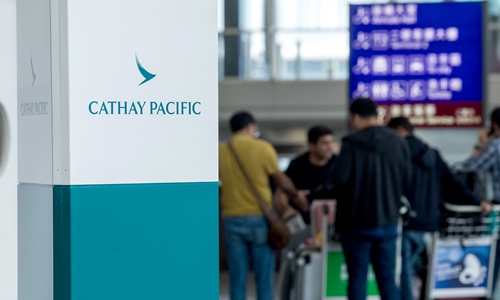Cathay Pacific drops HK airline brand
By GT staff reporters Source: Global Times Published: 2020/10/21 21:48:40
Move signals challenges for city’s economic recovery: observers

Cathay Pacific's logo seen in Hong Kong International Airport in March Photo: VCG
Cathay Pacific announced on Wednesday a restructuring plan that will involve axing its major regional airline Cathay Dragon - the main airline connecting Hong Kong and the Chinese mainland - which was embroiled in a controversy last year over employees supporting rioters.
The airline will lay off thousands of employees, a move that observers said reflects British capitalists' lack of concern over the city's development and indicates potential challenges for the recovery of Hong Kong's struggling economy under the double impact of social unrest and the COVID-19 pandemic.
The move came only months after the company got a HK$27.3 billion ($3.52 billion) bailout from the Hong Kong Special Administrative Region (HKSAR).
The group said in a filing to the Hong Kong stock exchange that it would cut approximately 8,500 positions in the entire group, accounting for about 24 percent of its established headcount, and Cathay Dragon will cease operations in a HK$2.2 billion restructuring to cope with the fallout of the global pandemic.
About 5,300 local employees will be made redundant, which means that almost all staff of the 35-year-old Cathay Dragon unit will lose their jobs, in stark contrast to only 600 employees based outside of Hong Kong.
In response to the continued impact of the COVID-19 pandemic on the aviation market, the corporate restructuring will "enable the company to secure its future, so it can protect as many jobs as possible, while meeting its responsibilities to the Hong Kong aviation hub and its customers," Cathay Pacific said.
Amid a plunge in air travel globally, the group axed many flights this year. Cathay Pacific and its wholly owned regional subsidiary Cathay Dragon in total carried 47,061 passengers in September, a plunge of 98.1 percent year-on-year. In the first nine months of 2020, the number of passengers slumped 83.2 percent year-on-year, data from the group showed.
Four months ago, the group secured HK$39 billion in recapitalization financing, including the HKSAR's Land Fund worth HK$27.3 billion, to help it weather the extreme business climate and uphold Hong Kong's status as an international aviation hub in the region, which unfortunately didn't stop the "commercial decision" of the Swire Group-controlled airline.
Observers said that Hong Kong's social unrest and the global pandemic sparked Cathay Pacific's restructuring, but the root cause was a raft of problems with the group's operation and management.
Cathay Pacific already faced heavy external and management challenges before the pandemic, which then amplified the group's drawbacks, Lin Zhijie, a market watcher from Aviation Think Tank under the Civil Aviation Administration of China, told the Global Times on Wednesday.
The group posted heavy losses from fuel-hedging contracts, after reporting massive fuel-hedging losses of HK$6.4 billion in 2017.
Cathay Pacific acquired low-cost carrier HK Express in a huge HK$4.93 billion deal, at a high premium.
In 2019, it came under criticism on the Chinese mainland as it showed a lukewarm attitude in drawing a line with its radical employees who took part in violent protests in the HKSAR.
Against this backdrop, two of the carrier's senior executives resigned and its chairman retired, but those moves didn't help the airline win back mainland customers, leading to a 28-percent plunge in the group's profit to HK$1.69 billion last year.
As an airline that mainly connects Hong Kong and the mainland, Cathay Dragon should be the last choice if Cathay Pacific had to cut one brand because Hong Kong flights to and from the mainland may be the fastest to recover compared with overseas flights, Qi Qi, a civil aviation expert, told the Global Times on Wednesday.
However, the group chose to hand over the majority of Cathay Dragon's routes to Cathay Pacific and HK Express, which Qi said will only increase Cathay Dragon's monopoly in the Hong Kong aviation market but do no good to the city itself.
"The restructuring has something of a political flavor as it's a UK-invested firm operating in Hong Kong," Qi said. British capitalists seek to maximize their profits while caring little about the interests of their employees and the disappearance of a Hong Kong brand, he said, noting that they treat Hong Kong as a cash cow.
The closure of Cathay Dragon indicates potential challenges ahead for HKSAR, whose economy is struggling due to the combined effects of social unrest and the global pandemic, experts said, noting that the central government will come up with policies to support the city's economic and social recovery.
Posted in: SOCIETY